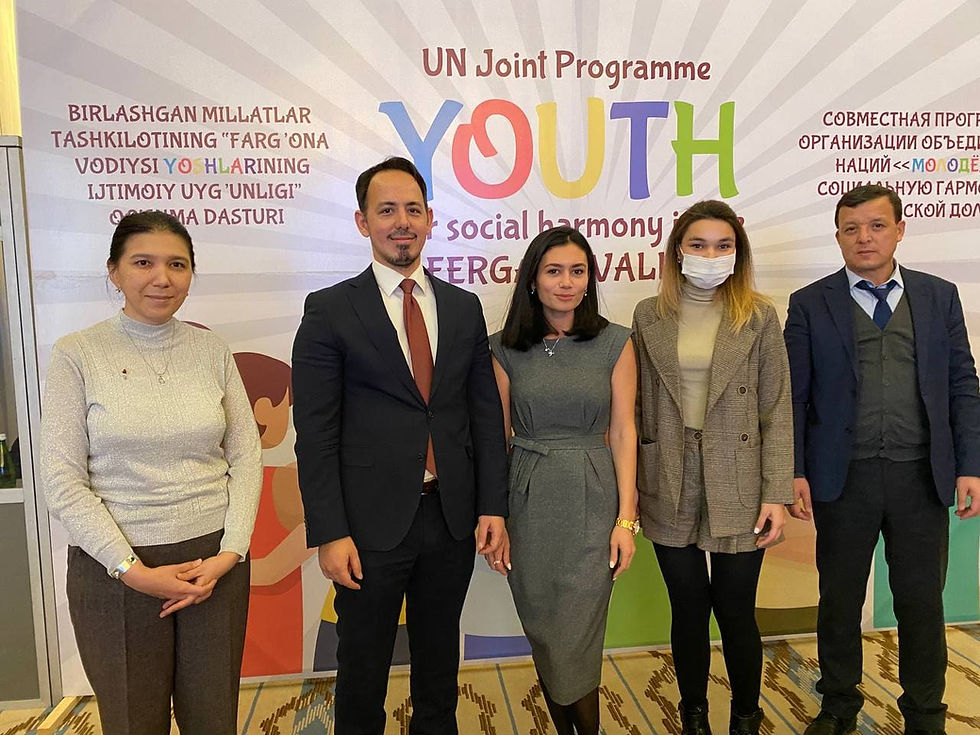RB ASIA conducted study for UNDP on: "Assessment of the youth’s needs in Fergana Valley"
- RB ASIA
- Nov 11, 2021
- 3 min read
On November 4, 2021, a seminar was held at the Hyatt Regency Tashkent on the results of the study, conducted by RB ASIA in cooperation with UNDP and the Agency for Youth Affairs of Republic of Uzbekistan (hereinafter - AYA).

The seminar was attended by young people from various organizations and universities, representatives of companies that contributed to the development of the project "Youth for Social Harmony in the Fergana Valley", such as AYA, UNDP, UNESCO, UNODC. At the seminar, there were discussed the events which held to support the social and economic initiatives of youth, such as Y-Fikri (youth discussion platform for social change), the Fergana Valley Young Leaders Summer School, and Technovation Girls Fergana Valley, also there were presented the final results of the research and there was held a discussion on the carried out topic.
The President of the Republic of Uzbekistan declared 2021 the Year of Supporting Youth and Strengthening the Health of the Population, for this, the country pays great attention to educating young people in the physical, intellectual and emotional terms, as well as protecting their rights and interests, therefore holding a number of events to support ambitious young people. It is known that approximately 60% of the population of Uzbekistan is the younger generation, and with the correct distribution of the potential of young people, there a great success can be achieved in the future, while not rational use of the mental abilities of young people can lead to a high rate of unemployment in the country.
The study involved 1504 young people aged 18-30, including 303 people from socially vulnerable categories of youth. In the course of the study, there was a number of interviews, polls were conducted, and there were appropriate conclusions and recommendations made.

The share of women (girls) among the respondents was 50.3%, and among socially vulnerable respondents - 52.1%. Moreover, there were more than 25 in-depth interviews and 6 FGDs conducted with representatives of state and public organizations and the youth. The study covered 13 rural areas and cities of the Fergana Valley, including regional centers.
The main objectives of the study were identifying the main social, economic, political needs and aspirations of young people in the Fergana Valley, assessment of the level of young people’s involvement in the socio-economic reforms carried out in the country, also the development of recommendations for improving the socio-economic situation of young generation.
The main socio-economic needs and barriers to implementation in the research were identified, such as:
• Access to education and employment;
•Internet access;
• Migration attitudes of youth;
• Social well-being;
• Family installations;
• Organizations involved in youth support.
Education. According to the results of the study, the share of young people with higher education is 7.7%. The main barrier to the realization of youth is the low level of diversification of professions in the labor market in the Fergana Valley. Nevertheless, 48.8% of respondents believe that higher education is available to everyone. Also, the majority of respondents (41.7%) believe that professional education is required for both girls and boys.
Employment. In the course of the study, it was revealed that the share of working respondents is 70.2%, and most of them is satisfied with the working conditions. Among the respondents, there is a very high proportion of those who employed at home and in family business, which is undoubtedly a huge benefit in the development of entrepreneurship in the region.
Business. Moreover, more than half of young people expressed their opinion about starting their own business. However, one of the important barriers was the lack of start-up capital (58%). In order to start their own business, the respondents would like to receive support in the form of loans and tax benefits, assistance in obtaining land and premises, and other aspects.
Internet. 79.5% of young people constantly or periodically use the Internet, for girls this figure is 66%.
Migration. So about 16% of those surveyed plan to leave their work in the near future, while 13% of them want to go abroad for searching work. Moreover, among working people, migration intentions are 2 times higher than among non-working youth. It should be noted that the main triggers are low wages in the region.
Social well-being. Despite the difficulties faced by young people, the majority of respondents feel confident for their future (69%) and hope for the best (26%). The young people of the Fergana Valley are sure that their well-being depends mostly on themselves.
Values. Family, health and interesting work are important values among the surveyed respondents. It should be noted that 76% of the respondents answered that they are satisfied with their family life, 41% of the respondents believe that they have the right to choose their future life partner.
Also, in the course of the research, it was revealed that makhallas play an important role in supporting the younger generation and solving its problems.

The research results and recommendations were provided to responsible organizations that are able to promote the socio-economic development of young people in the Fergana Valley.
コメント